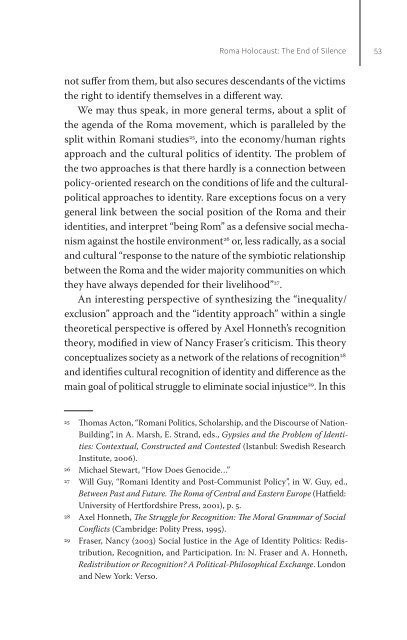FOR REMEMBRANCE OF THE ROMA GENOCIDE
6Zcx0LQui
6Zcx0LQui
Create successful ePaper yourself
Turn your PDF publications into a flip-book with our unique Google optimized e-Paper software.
Roma Holocaust: The End of Silence 53<br />
not suffer from them, but also secures descendants of the victims<br />
the right to identify themselves in a different way.<br />
We may thus speak, in more general terms, about a split of<br />
the agenda of the Roma movement, which is paralleled by the<br />
split within Romani studies 25 , into the economy/human rights<br />
approach and the cultural politics of identity. The problem of<br />
the two approaches is that there hardly is a connection between<br />
policy-oriented research on the conditions of life and the culturalpolitical<br />
approaches to identity. Rare exceptions focus on a very<br />
general link between the social position of the Roma and their<br />
identities, and interpret “being Rom” as a defensive social mechanism<br />
against the hostile environment 26 or, less radically, as a social<br />
and cultural “response to the nature of the symbiotic relationship<br />
between the Roma and the wider majority communities on which<br />
they have always depended for their livelihood” 27 .<br />
An interesting perspective of synthesizing the “inequality/<br />
exclusion” approach and the “identity approach” within a single<br />
theoretical perspective is offered by Axel Honneth’s recognition<br />
theory, modified in view of Nancy Fraser’s criticism. This theory<br />
conceptualizes society as a network of the relations of recognition 28<br />
and identifies cultural recognition of identity and difference as the<br />
main goal of political struggle to eliminate social injustice 29 . In this<br />
25 Thomas Acton, “Romani Politics, Scholarship, and the Discourse of Nation-<br />
Building”, in A. Marsh, E. Strand, eds., Gypsies and the Problem of Identities:<br />
Contextual, Constructed and Contested (Istanbul: Swedish Research<br />
Institute, 2006).<br />
26 Michael Stewart, “How Does Genocide…”<br />
27 Will Guy, “Romani Identity and Post-Communist Policy”, in W. Guy, ed.,<br />
Between Past and Future. The Roma of Central and Eastern Europe (Hatfield:<br />
University of Hertfordshire Press, 2001), p. 5.<br />
28 Axel Honneth, The Struggle for Recognition: The Moral Grammar of Social<br />
Conflicts (Cambridge: Polity Press, 1995).<br />
29 Fraser, Nancy (2003) Social Justice in the Age of Identity Politics: Redistribution,<br />
Recognition, and Participation. In: N. Fraser and A. Honneth,<br />
Redistribution or Recognition? A Political-Philosophical Exchange. London<br />
and New York: Verso.


